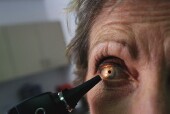- Double Mastectomy May Offer No Survival Benefit to Women With Breast Cancer
- Toxic Lead Found in Cinnamon Product, FDA Says
- Certain Abbott Blood Sugar Monitors May Give Incorrect Readings
- Athletes Can Expect High Ozone, Pollen Counts for Paris Olympics
- Fake Oxycontin Pills Widespread and Potentially Deadly: Report
- Shingles Vaccine Could Lower Dementia Risk
- Your Odds for Accidental Gun Death Rise Greatly in Certain States
- Kids From Poorer Families Less Likely to Survive Cancer
- Tough Workouts Won’t Trigger Cardiac Arrest in Folks With Long QT Syndrome
- At-Home Colon Cancer Test Can Save Lives
Animal Trials Show Promise for Treating Eye Cancer


New findings about the genetic roots of eye melanoma could lead to more effective treatments, scientists say. They also report an existing drug shows benefits as a treatment for eye tumors in mice.
So-called uveal melanoma — cancer that attacks parts of the eye that contain pigment cells — affects about 2,000 people in the United States each year. If the cancer hasn’t spread, patients usually undergo radiation treatment and have the affected eye removed. Oftentimes, however, the cancer spreads to the liver and quickly kills patients.
The study, published in the May 29 online issue of the journal Cancer Cell, offers insight into genetic mutations found in about 70 percent of the eye tumors. It also reveals a pathway that could be a target for medications.
The researchers suggest an existing drug, verteporfin (brand name Visudyne), could be a possible treatment. Tests on mice are promising, the study authors noted.
“The beauty of our study is its simplicity,” said study co-author Kun-Liang Guan, professor of pharmacology at University of California, San Diego Moores Cancer Center. “The genetics of this cancer are very simple and our results have clear implications for therapeutic treatments for the disease.”
This cancer is “caused by a very simple genetic mechanism,” Guan said in a university news release. “And we have a drug that works on this mechanism. The clinical applications are very direct,” Guan added.
However, results achieved in animal studies are not always replicated in humans.
More information
For more about melanoma of the eye, visit the U.S. National Library of Medicine.
Source: HealthDay
Copyright © 2024 HealthDay. All rights reserved.










